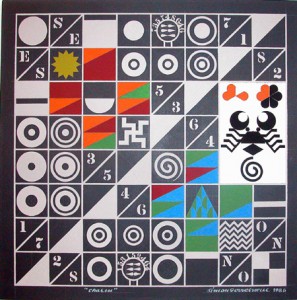Philosophy & Critical Studies
Before theorist Pierre Bourdieu became his favorite author and before he became a noted warlord in Chechnya, Musa Shanib was trained as a sociologist in the Soviet Union during the 1960s and 1970s. A native of central Caucasus, Shanib acquired a modest reputation as an “oppositionist” during his student days, but only came to prominence in 1988 when he began to speak on behalf of Mikhail Gorbachev’s reforms. As the Soviet center began to lose control of the political changes that it had set into motion, as the Baltics and other Soviet republics began to press for independence, Shanib followed the trend and turned to nationalism. In 1989, he helped create a pan-ethnic alliance of Abkhazians, which brought together a variety of mountain peoples in Georgia and parts of the Russian Caucasus. He drew his band of followers into fighting on the side of the Abkhazians in their separatist struggle in Georgia.
Recovering from a wound sustained during one of these battles, Shanib encountered Bourdieu’s 1987 work In Other Words, which became for him the most important book after the Koran. In his “world-system biography” of Shanib, sociologist Georgi Derluguian relies on several of Bourdieu’s concepts to understand the trajectory of Shanib from Soviet-era sociologist to nationalist warlord. While Shanib and others like him possessed little in the way of financial capital, they had acquired over the years what Bourdieu called “social capital.” This was the network of friends and institutional relationships that, when change came to the Soviet Union, propelled them to the forefront of politics. Oppositionist intellectuals, whose political ambitions were suppressed under the Soviet system, suddenly became important figures as a result of this wealth of social capital and the relative vacuum of power. The first leader of Georgia, Zviad Gamsakhurdia, was a Shakespeare scholar; he was overthrown by the joint efforts of a modernist sculptor and a film critic; the president of Armenia, Levon Ter-Petrossian, was a specialist in medieval manuscripts.
To realize their ambitions, these men, like Shanib, counted on the support of a class of dispossessed rural peoples, a “subproletariat” in Bourdieu’s terms. But their ultimate success or failure – and Shanib failed as a warlord – depended on their “habitus,” the way they saw the world and acted according to the sum total of their dispositions. Shanib’s critique of Soviet reality brought him into the forefront of change in the Caucasus, but his vision of a secular pan-Caucasus alliance could not compete with growing Islamic fundamentalism.
The difference between using philosophy to understand the world and using it to change the world was an early insight of Karl Marx: “Philosophers have hitherto only interpreted the world in various ways; the point is to change it,” he wrote in his Theses on Feuerbach. But Marx only articulated what others had figured out before. The Greek philosopher Plato wrote long, questioning treatises, including his blueprint for a new society The Republic, but made a terrible mess of it when the tyrant of Syracuse gave him an opportunity to put his ideas into practice. Political theorist Machiavelli had little patience for philosophical concepts that had no political, or real-world, relevance. French revolutionaries drew inspiration from philosophes like Voltaire and Rousseau; American revolutionaries relied on the democratic and egalitarian writings of Thomas Paine and others; Russian Bolsheviks were committed Marxists but disregarded his recommendation that communist revolution take place in advanced capitalist countries not underdeveloped agrarian societies.
A paradox lies at the center of philosophic activism. Critical thinking promotes the breaking down of received wisdom, the critiquing of that which exists, a kind of universal skepticism. Political action, however, requires the enumeration of alternatives, a positing of that which could exist, a measure of unquestioning faith. Musa Shanib made the transition from critical thinker to upholder of dogma before returning again to the university and his role as gadfly. Does critical thinking necessarily evaporate upon contact with power? Public intellectuals, in their application of philosophy to everyday life, continually struggle with this challenge, whether in the field of politics, ethics, law or science.
How can philosophy change our lives? How can philosophy change our world? If our understanding of reality is theory-laden – we understand the world according to a set of engrained theoretical approaches that function like a pair of intellectual glasses – does our use of critical thinking to understand our reality only add another layer of theoretical nuance? What wisdom are we left with after we’ve broken down all received wisdom? If critical thinking is a tool, must we use it all the time for it to be effective? Is there such a thing as “philosophy for philosophy’s sake”?
On a trip to Provisions, check out Cynthia Kaufman’s book Ideas for Action to see how critical thinking supports political activism, mine the journal Critical Inquiry for the latest philosophical nuggets, go online to trace the genealogy of Frankfurt School thought at Illuminations, check out the books of the philosophically minded artists in Critical Art Ensemble, listen via the Internet to the radio program Philosophy Talk, and watch the intriguing mix of animation and theory in Richard Linklater’s Waking Life.


